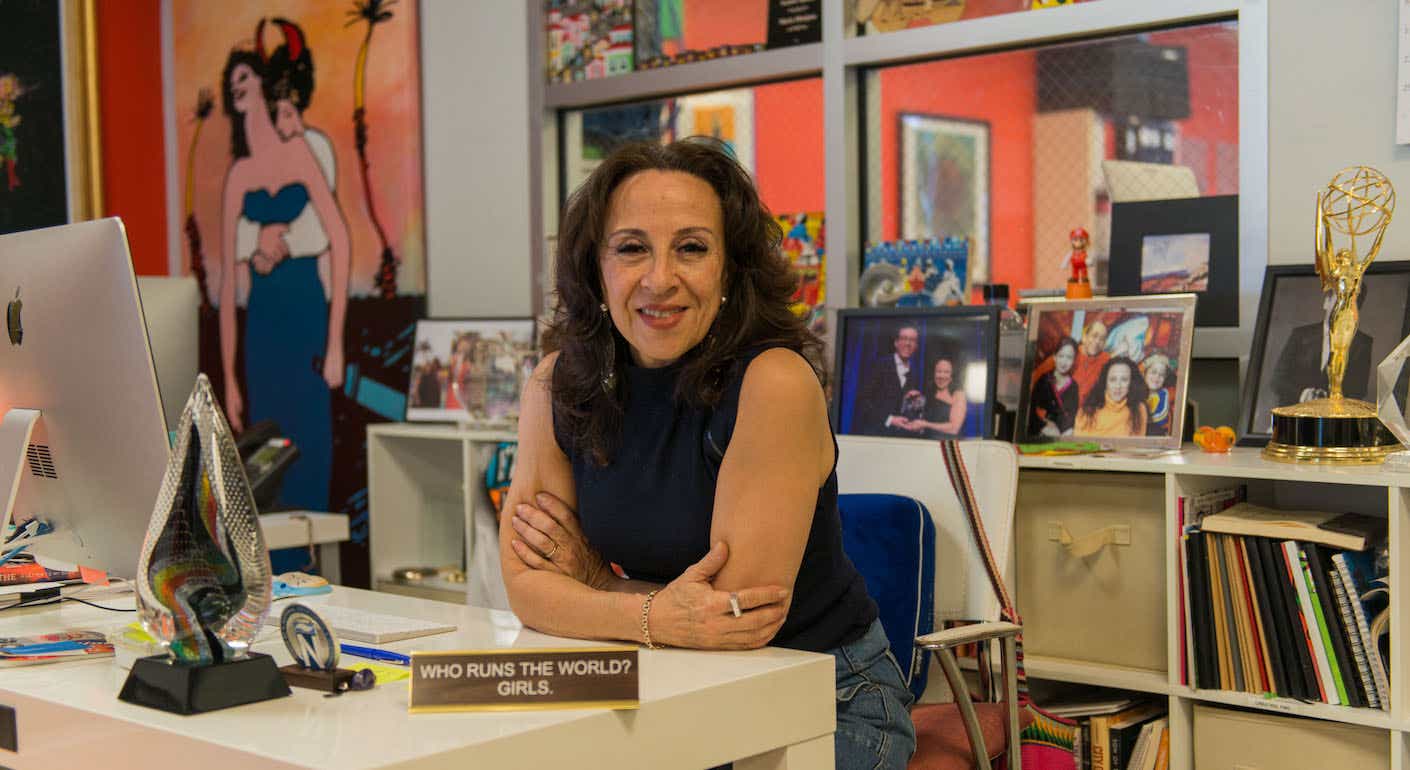In ‘Once I Was You,’ she charts her career path and looks at America’s attitude toward immigrants
Maria Hinojosa covers a lot of ground in her new book, Once I Was You. It’s part memoir — a look back on her career as the first Latina at NPR, her shift to broadcast at CNN and her leap to found her own company, Futuro Media. But it’s also packed with what Hinojosa refers to as “spinach,” a rigorous overview of America’s history of immigration policy and ultimately a condemnation of its hypocrisy.
“In many ways, in writing this I had to come to terms with the history of a country that says it loves immigrants on the one hand, but then historically and empirically — from both parties — is actually quite anti-immigrant,” she told KCM.
She began the book during one of the most openly xenophobic administrations in recent memory, though Hinojosa writes that regressive immigration policy didn’t start with President Trump and doesn’t belong only to the GOP. She presents a clear-eyed take on her brush with Barack Obama and her deep disappointment that a president, who carried 67% of the Latino vote in 2008, didn’t deliver on his promise of reform, and had to be pushed to the point of “public shaming” to enact DACA.
“It wasn’t the good ol’ days of Barack Obama when we’re talking about immigration,” Hinojosa said. “That is an illusion.”
Along with the “spinach,” Once I Was You offers an inside look at Hinojosa’s battle as a “journalist of conscience” to find her place in America’s most prestigious newsrooms. From proving she wasn’t “just an affirmative-action hire” at NPR, to writing copy for Walter Cronkite at CBS and along the way to Futuro, her seemingly constant struggle to push through the stories about the Latinx community that weren’t being told.
Hinojosa, who said she was inspired by the testimony of Christine Blasey Ford during Justice Brett Kavanaugh’s Supreme Court hearing, also shares a frank account of her sexual assault at 16, and the years she spent dealing with that trauma.
Hinojosa opened up about all that and more with KCM.
KCM: To start, can you tell me why you decided to write this book?
MH: My intention was first to write a little pocket book, called Illegal is Not a Noun, because that’s the statement that I made that went viral on MSNBC in 2016. I thought it would be about why you should never use the term illegal to describe a human being. The problem is that once I found an agent, because mine is retired, and got a publisher, they weren’t interested in that book. They said, ‘No we actually want a big book from you, not a little book.’
And so the decision was that it was not going to be just a memoir, but that it was going to be a historical memoir, where we were gonna add in a lot of spinach. So in many ways, in writing this I had to come to terms with the history of a country that says it loves immigrants on the one hand, but then historically and empirically — from both parties — is actually quite anti-immigrant.
You write in the book that there’s an anti-immigrant feeling in this country that is cyclical, and it’s not partisan. Can you expand on that?
So for me, I think most people know about Ronald Reagan being the person who normalized over 3 million, mostly Latinos, mostly Mexicans in 1986. What I didn’t know was that George H.W. Bush actually was the last person to substantially increase the number of refugees allowed into the United States. By the way, we’re talking less than half a million total, so it’s not like we’re bringing in millions upon millions of refugees. But George H.W. Bush was the last one to really increase those numbers, and Bill Clinton was the one that signed into law in 1996 all of these super regressive anti-immigrant laws and that Bill Clinton was the one who started the wall. Then you realize, really, a pox on both their houses.
One really interesting anecdote in the book is your coverage of Obama’s treatment of the DREAMers and how he really needed to be pushed to enact some sort of reform.
It wasn’t the good ol’ days of Barack Obama when we’re talking about immigration. It simply was not. That is an illusion and it is, in fact, a falsehood. Barack Obama and Joe Biden oversaw the deportation of upwards of 3 million people and the largest ever number of deportations from the interior of the United States — people who are living in Kansas City, Chicago, Buffalo, New York, Milwaukee, Missoula.
So it is very hard. Obama is my age. We went to school together — I was at Barnard, he was at Columbia. He lived in my old neighborhood in Chicago, his kids went to my old high school. He knows exactly who I am. He listened at one point and was a fan of Latino USA and liked my work because he told me. He’s a constitutional legal scholar, and on his watch, he oversaw millions of people being denied due process for the simple reason of not being born in this country.
With DACA, what ends up happening is that radical activists — documented and undocumented — in the tradition of African American civil disobedience, take over the office of Barack Obama’s campaign headquarters in 2012. And they said, we’re gonna take over more and more offices of yours and shame you for running a second term when you are deporting us and our families. That’s when they created the DACA program.
Let’s shift to your career. You were the first Latina at NPR. Can you talk a bit about what that was like and some of the challenges that came with that?
We were in the middle of a recession and journalists at NPR were being laid off. At the time, I was just really happy to have a job.
And I never could have just blended in at NPR. I am petite, I’ve always had pretty crazy hair, my style was boho chic before boho chic even existed. So I had to prove that I was hired because of my brain, and not the fact that I look interesting. I had to prove that I’m not an affirmative action hire, the way that you think that I am. I was going to prove to you that I can do stories beyond just Latinos and Latinas and immigrants. But I was up to the challenge.
The immigrant in me also understood that I had some responsibility. You do then have to represent those who couldn’t be here, because you’re the first. You better speak up, you don’t have the luxury of being afraid to raise your hand in the editorial meeting. No. You have to.
You reflect on your experience as a sexual assault survivor, when as a 16-year-old you were raped. Tell me what went into sharing that story.
For a long time, I didn’t know what the hell had happened. We did not have a term for this. Rape in the 70s was something that happened to a woman in a back alley by a stranger. But I definitely said no the entire time. I think that’s when I realized it — at one point when I was older, when people had pointed that out. Then you basically closet that, you don’t really discuss it.
And what happened was that Christine Blasey Ford and the Brett Kavanaugh hearings were happening as I was kind of in the midst of dealing with this stuff. So it felt fitting to include in a historical memoir.
There’s a saying in Mexican Spanish, “No tener pelos en la lengua,” which translates to “You don’t have any hair on your tongue” and means that you’re able to say things clearly. I write about how I resisted saying this term: you are a survivor.
And at some point, I was just like, no, it’s who you are. This man raped you. He is a predator. He knew exactly what he was going to do. And you were an adolescent who had every right in the world to want to have sex, to want to have sex with him under the right circumstances, but he became a predator. And getting to the other side of it, working with a therapist and being able to take your fear and rage and transform it into power is part of the message.
Looking ahead to the Biden administration, what issues do you think Latinos and Latinas would like to see action on right now?
The data shows that actually the number one issue for Latino and Latina voters is the economy and jobs. So if you’re in the administration you better be answering to that. Presenting relief for Covid where everybody gets aid — immigrants, undocumented immigrants, everybody. Right now, under the Trump administration, if you are married to an undocumented person you could not get the stimulus check.
Now discussing the issue of immigration, Biden has said that in the first 100 days he’s promised to reestablish DACA, and to begin some sort of reunification and some sort of immigration reform. So I can tell you as a journalist, I am already making plans for keeping him accountable.
I think right now, there’s kind of a wait and see attitude on this. What’s different now, compared to in 2008 is that there won’t be the same honeymoon period we gave Obama. The pressure to act on immigration is going to be there from day 1, and will only intensify.
This interview has been edited and condensed.












